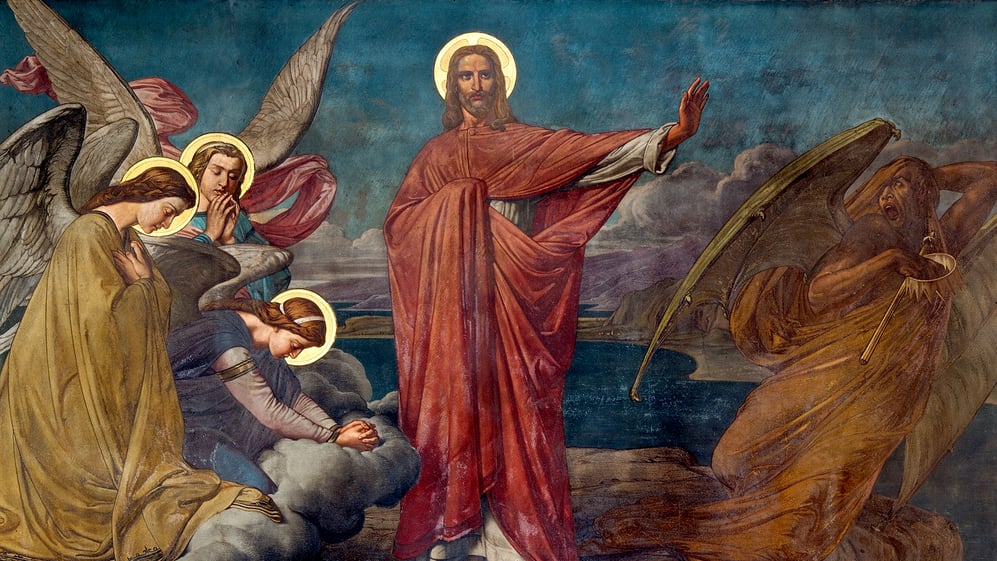In this weekend’s Gospel reading, we find Jesus calling Peter, Andrew, and James and John, the sons of Zebedee, to be His disciples. Mark moves quickly through John the Baptist’s call in the wilderness, his Baptism of Jesus, and Jesus’ temptation. When John baptizes Jesus, Jesus’ Father in heaven endorses His Son with the words, “with You I am well pleased.” (Mark 1:11) After this, Jesus endures Satan’s temptation in the wilderness, proving Himself to also be the Son of Man: He resists the lure of sin, unlike Adam and Eve in the Garden of Eden, and unlike the Israelites who wandered in the wilderness for forty years (an important parallel to the forty days Jesus spent in the wilderness). Jesus calls out that the kingdom of God—His kingdom—is at hand. In this context, Jesus initiates His earthly ministry by calling the disciples with whom He will share it.
Scripture Interprets Scripture
There are two points of interest regarding Peter and his occupation as a fisherman and then apostle. In the parable of the net, Jesus says, “Again, the kingdom of heaven is like a net that was thrown into the sea and gathered fish of every kind” (Matthew 13:47). Jesus calls Peter from his work as a fisherman to reach out to the lost. In the parable, the net represents this kind of outreach, although some will refuse it.
It is also noteworthy that Jesus’ call to Peter at the shore is not the last. Following Peter’s denial, Jesus calls Peter once again to “feed My lambs” (John 21:15). The apostle who walked away is called again, restored to his previous ministry. The double call to Peter relates to the Old Testament lesson. The Lord calls Jonah to travel to Nineveh to call the people there to repentance. Despite Jonah’s disobedience, God calls the prophet from the great fish and tells him a second time to go to Nineveh. This commonality highlights the mercy application of the Gospel.
Digging Out the Gems
In verse fifteen of our text, Jesus charges, “repent and believe in the gospel” (Mark 1:15). In Greek, this reads, “μετανοεῖτε καὶ πιστεύετε ἐν τῷ εὐαγγελίῳ.” Both of these verbs, “μετανοεῖτε” and “πιστεύετε”, are in the present tense and have plural subjects. In other words, Jesus calls all unbelievers to trust in Him for salvation, for He is the kingdom of God at hand. He is the Gospel made manifest. One use of the present tense in Greek is the continuous aspect. This means that the verb is not only effectual immediately but is also ongoing. So one might translate the above Greek verbs as “repent continuously” and “believe continuously.”
There are two important applications here. One, for the Christian, repentance is a lifelong process. We change our minds (the literal meaning of the Greek verbs) repeatedly, almost constantly throughout our lives. Likewise, we believe in Jesus continuously until the Lord takes us home. More importantly, the verbs reflect the continuous work of the Holy Spirit. Where we cannot repent, the Holy Spirit continually empowers us to do so. The same with belief. So the Lord works in our lives continually until He takes us home.
Law and Gospel
The overarching application of the Law in this passage is to point out the hesitancy of God’s people to accept His call to teach the faithful and to reach the lost, which the apostles both succeeded and failed to do. Naturally, rejecting God’s call finds its roots in sin against the First Commandment. If a Christian were to obey this most primary of God’s Commandments, there would be no reason for a call in the first place. Peter and the others would have sought out Jesus, and Jonah would have needed no coaxing. Sinners fail to answer God’s call because they prioritize the “call” of other aspects of life over that of Jesus. It’s important to convey in preaching or teaching this pericope that idolatry in this regard is not necessarily prioritization of sinful elements, as is the case with Paul’s admonition against sexual sin; idolatry can even be prioritization of God’s gifts over God Himself.
The Gospel in this passage comes in immediately. The kingdom of God is at hand, and this is Jesus Himself. The kingdom is shown in the birth of Christ, as well as in His Baptism, temptation, and call to the first disciples. As He did with them, He deigns to call even sinners, including you and me.
Continue reading more about Mark 1 in Dr. James Voelz's Concordia Commentary.














